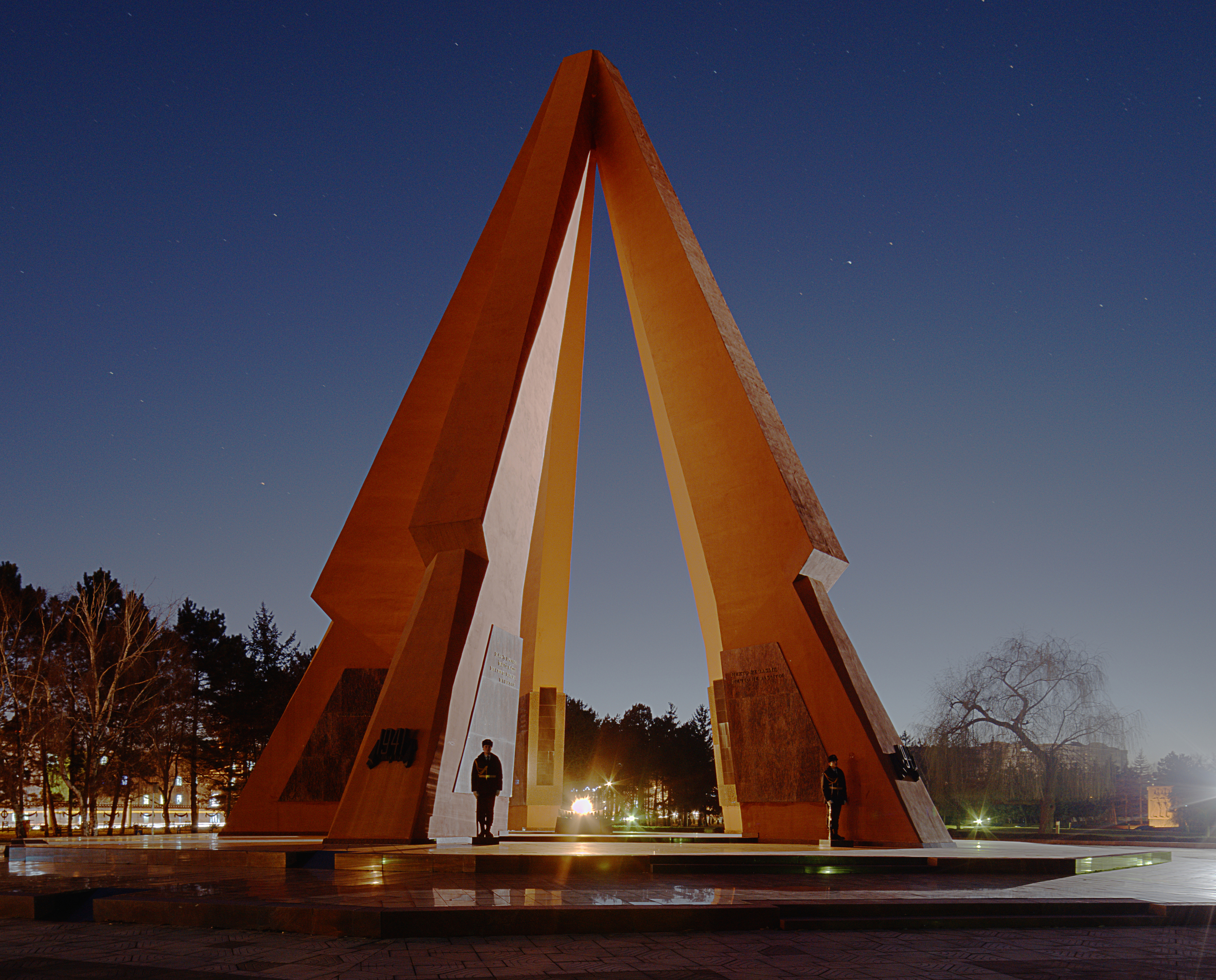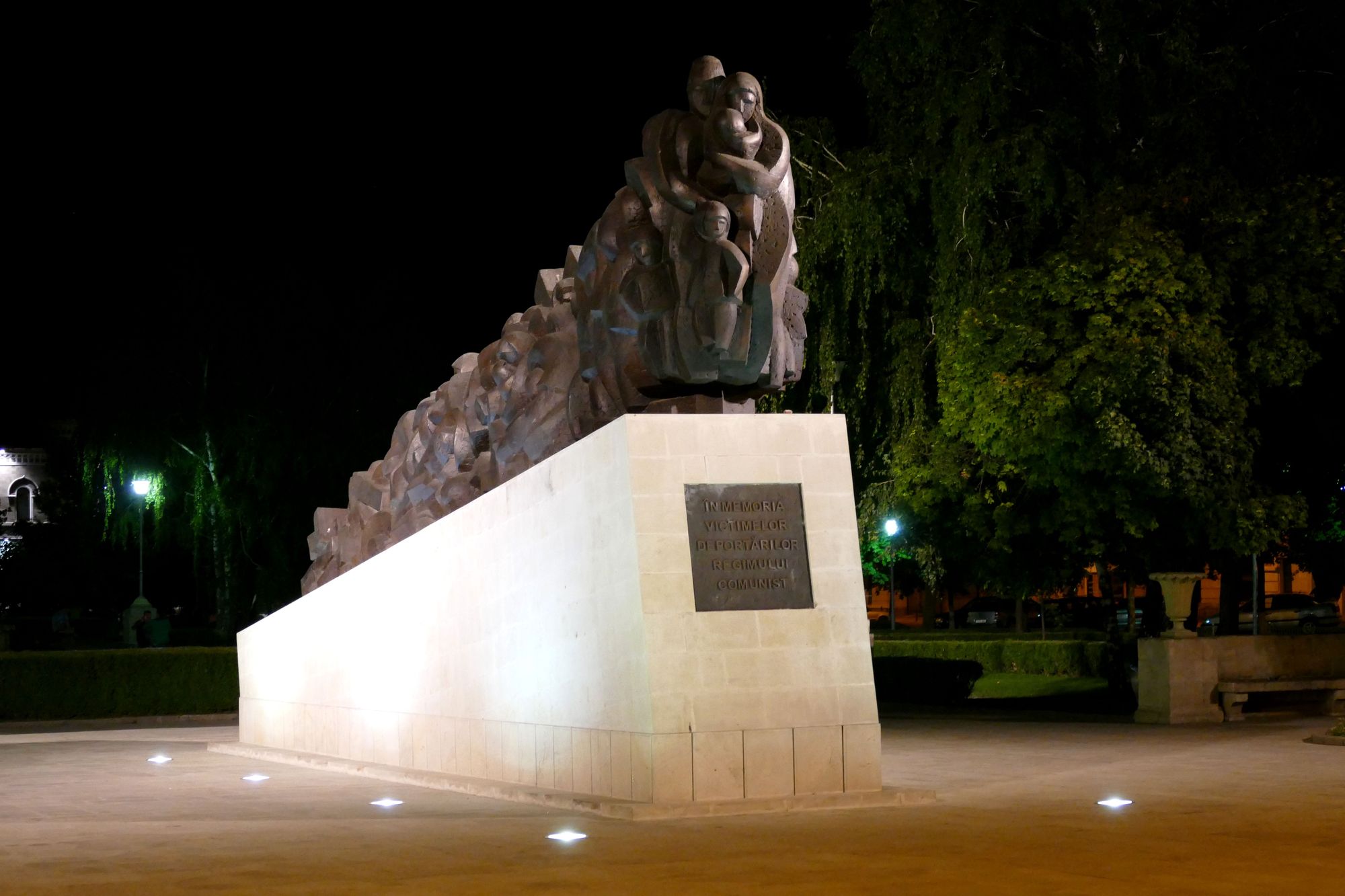|
Trușeni
Trușeni is a commune and village in the Buiucani Sector of the Chisinau Municipality, Moldova. It had a population of 10,380 at the 2014 Moldovan Census, and is a northwest suburb of Chișinău. The commune is composed of two villages, Dumbrava (population 406) and Trușeni (population 7,546, according to the 2004 Moldovan census). Etymology The name Trușeni may have originated form its legendary founder "Toader Truș" with local residents calling it "În sat alde Truș" (In Truș' village) before overtime calling it Trușeni. History Legend says that a certain Toader Truș left his hometown of Turluești and settled the village of Trușeni at where it is now, albeit this is only a legend and has no significant historical backing. The earliest documentary mention of Trușeni is from a charter by Petru Rareș in the Principality of Moldavia in relation to setting the boundaries of the local Căpriana Monastery. However, according to the Statistical Dictionary of Bessara ... [...More Info...] [...Related Items...] OR: [Wikipedia] [Google] [Baidu] |
Chișinău Municipality
Chișinău ( , , ; formerly known as Kishinev) is the capital and largest city of Moldova. The city is Moldova's main industrial and commercial centre, and is located in the middle of the country, on the river Bîc, a tributary of the Dniester. According to the results of the 2014 census, the city proper had a population of 532,513, while the population of the Municipality of Chișinău (which includes the city itself and other nearby communities) was 700,000. Chișinău is the most economically prosperous locality in Moldova and its largest transportation hub. Nearly a third of Moldova's population lives in the metro area. Moldova has a history of winemaking dating back to at least 3,000 BCE. As the capital city, Chișinău hosts the yearly national wine festival every October. Though the city's buildings were badly damaged during the Second World War and earthquakes, a rich architectural heritage remains. In addition, it has numerous buildings designed in the postwar Socia ... [...More Info...] [...Related Items...] OR: [Wikipedia] [Google] [Baidu] |
Chișinău
Chișinău ( , , ; formerly known as Kishinev) is the Capital city, capital and List of cities and towns in Moldova, largest city of Moldova. The city is Moldova's main industrial and commercial centre, and is located in the middle of the country, on the river Bîc, a tributary of the Dniester. According to the results of the 2014 Moldovan census, 2014 census, the city proper had a population of 532,513, while the population of the Municipality of Chișinău (which includes the city itself and other nearby communities) was 700,000. Chișinău is the most economically prosperous locality in Moldova and its largest transportation hub. Nearly a third of Moldova's population lives in the metro area. Moldova has a Moldovan wine, history of winemaking dating back to at least 3,000 BCE. As the capital city, Chișinău hosts the yearly national wine festival every October. Though the city's buildings were badly damaged during the World War II, Second World War and earthquakes, a rich a ... [...More Info...] [...Related Items...] OR: [Wikipedia] [Google] [Baidu] |
Anthem Of Trușeni
An anthem is a musical composition of celebration, usually used as a symbol for a distinct group, particularly the national anthems of countries. Originally, and in music theory and religious contexts, it also refers more particularly to short sacred choral work (still frequently seen in Sacred Harp and other types of shape note singing) and still more particularly to a specific form of liturgical music. In this sense, its use began in English-speaking churches; it uses English language words, in contrast to the originally Roman Catholic 'motet' which sets a Latin text. Etymology ''Anthem'' is derived from the Greek (''antíphōna'') via Old English . Both words originally referred to antiphons, a call-and-response style of the singing. The adjectival form is "anthemic". History Anthems were originally a form of liturgical music. In the Church of England, the rubric appoints them to follow the third collect at morning and evening prayer. Several anthems are included in the ... [...More Info...] [...Related Items...] OR: [Wikipedia] [Google] [Baidu] |
Playwright
A playwright or dramatist is a person who writes play (theatre), plays, which are a form of drama that primarily consists of dialogue between Character (arts), characters and is intended for Theatre, theatrical performance rather than just Reading (process), reading. Ben Jonson coined the term "playwright" and is the first person in English literature to refer to playwrights as separate from Poet, poets. The earliest playwrights in Western literature with surviving works are the Ancient Greeks. William Shakespeare is amongst the most famous playwrights in literature, both in England and across the world. Etymology The word "play" is from Middle English , from Old English ("play, exercise; sport, game; drama, applause"). The word ''wikt:wwright'' is an archaic English term for a Artisan, craftsperson or builder (as in a wheelwright or Wagon, cartwright). The words combine to indicate a person who has "wrought" words, themes, and other elements into a dramatic form — a play. ... [...More Info...] [...Related Items...] OR: [Wikipedia] [Google] [Baidu] |
Constantin Cheianu
Constantin Cheianu (born 21 September 1959) is a writer, playwright, prose writer, publicist, actor and TV anchor and journalist from the Republic of Moldova. As a dramaturg at the National Theatre in Chişinău, he adapted multiple novels for the stage. In 1993, together with the movie director Alexandru Vasilache he became co-founder of the Pocket Theatre (). Together with Anatol Durbala he leads the show ''Ora de Râs'' at Jurnal TV. After graduating from the Faculty of Letters of the Moldova State University in Chișinău (1982), he became the editor of ''Literatura și Arta'' newspaper, where he starts with the short novel "Roua nouă". Biography Constantin Cheianu was born on 21 September 1959 in Truşeni. He studied philology at Moldova State University before working as an author and editor for newspapers, magazines and radio. He has written about ten plays performed in Moldova and Romania. He worked for Literatura şi Arta, Contrafort, Sud-Est (magazine), Jurnal de C ... [...More Info...] [...Related Items...] OR: [Wikipedia] [Google] [Baidu] |
Kindergarten
Kindergarten is a preschool educational approach based on playing, singing, practical activities such as drawing, and social interaction as part of the transition from home to school. Such institutions were originally made in the late 18th century in Germany, Bavaria and Alsace to serve children whose parents both worked outside home. The term was coined by German pedagogue Friedrich Fröbel, whose approach globally influenced early-years education. Today, the term is used in many countries to describe a variety of educational institutions and learning spaces for children ranging from two to six years of age, based on a variety of teaching methods. History Early years and development In 1779, Johann Friedrich Oberlin and Louise Scheppler founded in Strasbourg an early establishment for caring for and educating preschool children whose parents were absent during the day. At about the same time, in 1780, similar infant establishments were created in Bavaria. In 1802, Princ ... [...More Info...] [...Related Items...] OR: [Wikipedia] [Google] [Baidu] |
Jewish
Jews (, , ), or the Jewish people, are an ethnoreligious group and nation, originating from the Israelites of History of ancient Israel and Judah, ancient Israel and Judah. They also traditionally adhere to Judaism. Jewish ethnicity, religion, and community are highly interrelated, as Judaism is their ethnic religion, though it is not practiced by all ethnic Jews. Despite this, religious Jews regard Gerim, converts to Judaism as members of the Jewish nation, pursuant to the Conversion to Judaism, long-standing conversion process. The Israelites emerged from the pre-existing Canaanite peoples to establish Kingdom of Israel (Samaria), Israel and Kingdom of Judah, Judah in the Southern Levant during the Iron Age.John Day (Old Testament scholar), John Day (2005), ''In Search of Pre-Exilic Israel'', Bloomsbury Publishing, pp. 47.5 [48] 'In this sense, the emergence of ancient Israel is viewed not as the cause of the demise of Canaanite culture but as its upshot'. Originally, J ... [...More Info...] [...Related Items...] OR: [Wikipedia] [Google] [Baidu] |
Gagauzians
The Gagauz (; ) are a Turkic ethnic group native to southern Moldova (Gagauzia, Taraclia District, Basarabeasca District) and southwestern Ukraine (Budjak). Gagauz are mostly Eastern Orthodox Christians. The term Gagauz is also often used as a collective naming of Turkic people living in the Balkans, speaking the Gagauz language, a language separated from Balkan Gagauz Turkish. Etymology ''Gagauz'' is the most widely accepted singular and plural form of the name, and some references use ''Gagauzy'' (from Ukrainian) or ''Gagauzi''. Other variations including ''Gagauzes'' and ''Gagauzians'' appear rarely. Before the Russian Revolution they were commonly referred to as "Turkic-speaking old Bulgars". Gagauz agricultural settlers in Uzbekistan called themselves "Eski Bulgarlar" (meaning Old Bulgars) in the 1930s. According to Astrid Menz: Geographical distribution Outside Moldova, a minority of Gagauz people live in the Ukrainian regions of Odesa and Zaporizhzhia. They ... [...More Info...] [...Related Items...] OR: [Wikipedia] [Google] [Baidu] |
Bulgarians
Bulgarians (, ) are a nation and South Slavs, South Slavic ethnic group native to Bulgaria and its neighbouring region, who share a common Bulgarian ancestry, culture, history and language. They form the majority of the population in Bulgaria, while in Bulgarians in North Macedonia, North Macedonia, Bulgarians in Ukraine, Ukraine, Bessarabian Bulgarians, Moldova, Bulgarians in Serbia, Serbia, Bulgarians in Albania, Albania, Bulgarians in Romania, Romania, Bulgarians in Hungary, Hungary and Bulgarians in Greece, Greece they exist as historical communities. Etymology Bulgarians derive their ethnonym from the Bulgars. Their name is not completely understood and difficult to trace back earlier than the 4th century AD, but it is possibly derived from the Proto-Turkic word ''*bulģha'' ("to mix", "shake", "stir") and its derivative ''*bulgak'' ("revolt", "disorder"). Alternative etymologies include derivation from a compound of Proto-Turkic (Oghuric languages, Oghuric) ''*bel'' ("fi ... [...More Info...] [...Related Items...] OR: [Wikipedia] [Google] [Baidu] |
Romani People
{{Infobox ethnic group , group = Romani people , image = , image_caption = , flag = Roma flag.svg , flag_caption = Romani flag created in 1933 and accepted at the 1971 World Romani Congress , pop = 2–12 million , region2 = United States , pop2 = 1 million estimated with Romani ancestry{{efn, 5,400 per 2000 United States census, 2000 census. , ref2 = {{cite news , first=Kayla , last=Webley , url=http://content.time.com/time/nation/article/0,8599,2025316,00.html , title=Hounded in Europe, Roma in the U.S. Keep a Low Profile , agency=Time , date=13 October 2010 , access-date=3 October 2015 , quote=Today, estimates put the number of Roma in the U.S. at about one million. , region3 = Brazil , pop3 = 800,000 (0.4%) , ref3 = , region4 = Spain , pop4 = 750,000–1.5 million (1.5–3.7%) , ref4 = {{cite web , url ... [...More Info...] [...Related Items...] OR: [Wikipedia] [Google] [Baidu] |




